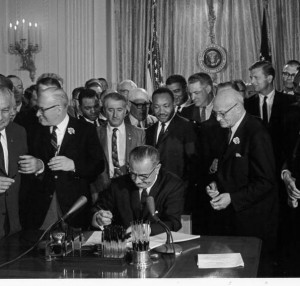President Barack Obama will join former Presidents Jimmy Carter, Bill Clinton and George W. Bush this week at the LBJ Presidential Library Library in Austin, Texas, to honor the 50th anniversary of the Civil Rights Act.
The gathering of the current and former presidents is associated with the Civil Rights Summit, a three-day event that is part of the national celebration of the half century that has passed since President Lyndon Johnson signed the Civil Rights Act into law.
It should also be noted that this year also marks 50 years since President Johnson declared the War on Poverty during his January 8, 1964 State of the Union address.
During that speech Johnson stated: “This administration today, here and now, declares unconditional war on poverty in America. It will not be a short or easy struggle, no single weapon or strategy will suffice, but we shall not rest until that war is won. The richest nation on earth can afford to win it. We cannot afford to lose it.”
It is good that past and the present president and the civil rights community are celebrating those two momentous events. However, in a time when America is facing challenges to full voting rights, has one of the highest incarceration rates in the world, and unprecedented income inequality, we should also reflect upon how the hopes of 1964 compare with the realities of 2014.
We certainly recognize there have been significant and undeniable gains in many areas of civil rights and equal access to public accommodations. However, racial disparities in income, employment, health care, criminal and juvenile justice, and education persist.
This is coupled with concerted efforts from some segments of our society to shred the social safety net, deny 11.5 million undocumented residents legal status, and make it more difficult for some Americans to exercise their right to vote.
What this all means is that historical milestones such as the passage of the Civil Rights Act and the declaration of the War on Poverty are important, relevant, and should be celebrated. However, the key message is that ending centuries of racial, gender and economic injustices cannot be achieved in a half century.
The recent Supreme Court decision that essentially gutted the Voters Rights Act of 1965 should remind us that gains achieved 50 years ago are by no means permanent.
It is therefore, important that social workers and others who embrace civil rights and social justice reflect on historical milestones, but remain committed to full throated advocacy to finally end of all social and economic injustices in the United States.
For more information on National Association of Social Workers activities surrounding social justice issues such as voting rights and prison reforms, contact Mel Wilson, manager of NASW’s Department of Social Justice and Human Rights, at mwilson@naswdc.org.




